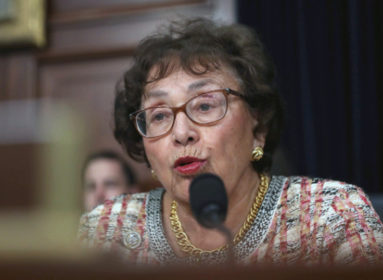
Ehud Barak
JERUSALEM – The week began with a political bombshell that appeared to leave Israel’s Labor party reeling, while her ruling Likud party stood on sturdier ground.
On Monday, Defense Minister Ehud Barak stunned reporters when he announced at a Knesset press conference that he and four other Labor lawmakers were leaving their party to form a new faction called “Atzmaut” – Hebrew for “Independence.”
Barak, who served until now as chairman of Labor, was joined by Agriculture Minister Shalom Simhon; Deputy Defense Minister Matan Vilnai; Deputy Industry, Trade and Labor Minister Orit Noked; and Knesset member Einat Wilf.
“We are creating a faction, a movement and eventually a party that will be centrist, Zionist and democratic,” Barak said, noting that he and his four allies were finding it impossible to function in the Labor Party given the constant threats by ministers and Knesset members to break up the party if it did not leave Netanyahu’s coalition. Recently, several Labor lawmakers, frustrated by the lack of progress in the peace negotiations with the Palestinians, had threatened to quit the coalition.
Just hours after Barak’s split with the party, three Labor government ministers announced their departure from Prime Minister Benjamin Netanyahu’s government coalition. The exiting ministers were: Social Affairs Minister Isaac Herzog; Minister for Minority Affairs Avishay Braverman; and Minister of Industry, Trade and Labor Benjamin Ben-Eliezer.
By day’s end, many Israeli media outlets were speculating that Barak’s sudden exit was not so sudden after all. According to Ha’aretz, the plan to split Labor was hatched over the course of the past two week’s in secret meetings between Barak, Netanyahu and his chief of staff Natan Eshel, held at Netanyahu’s residences in Jerusalem and Caesarea.
Despite a demand from opposition leader Tzipi Livni, head of the Kadima Party, that Netanyahu call for new elections, coalition negotiations between Netanyahu’s Likud party and the newly formed Atzmaut were already in full swing.
Barak immediately received Netanyahu’s commitment to remain defense minister. It was further expected that Simhon, Barak’s close ally, would step up to Ben-Eliezer’s post; Noked, who represents Labor’s kibbutz sector, would replace Simhon; Vilna’i will keep his present responsibilities, while being promoted to minority affairs minister; and Wilf, a Knesset freshman who is currently on maternity leave, will chair the Atzmaut faction and will become chairwoman of the Knesset Education Committee in several months.
Netanyahu said he believed his government would appear stronger in the eyes of the international community by these moves, as well as the departure of eight Labor members of Knesset from his coalition government.
“The entire world knows, and so do the Palestinians, that this government will be here for the coming years, and it is with this government that it will have to conduct the peace process,” Netanyahu said. “I want to have [a peace process] and advance it on the basis of promoting our interests of achieving security and peace.”
Writing in the Jerusalem Post, the paper’s chief political correspondent and analyst Gil Hoffman concluded that Netanyahu’s government could now operate without the “artifical deadline” of the next Labor convention and that the strengthening of the coalition sent a message to Palestinian Authority president Mahmoud Abbas and President Barack Obama that “they are stuck with him for the foreseeable future, so they will have to deal with him now.”
Hoffman also saw in Barak’s move renewed hopes for a settlement.
“Netanyahu will now want to prove to Barak that he made the right decision to stay. And that means that serious diplomatic concessions are likely on the way,” he wrote.
Barak is not the first of Israel’s top political figures to leave their parties to form new ones. As he noted in his press conference, former Prime Ministers David Ben-Gurion, Shimon Peres and Ariel Sharon all bolted their respective parties, as well. Barack also criticized Labor for moving more and more to the left, noting that the diplomatic process was best advanced under the current government.
But the three departing Labor ministers saw it differently.
“The time has come to stop lying to ourselves and leave the government which has brought us to a dead-end and forced upon us Avigdor Lieberman and his party with its unacceptable racist discourse, which threatens our democracy,” said Herzog, who is the son of former Israeli president Chaim Herzog.
Braverman, whose announcement followed on the heels of Herzog’s by about an hour, said Labor ministers had told Barak in recent months that the party must not stay in the coalition so long as the peace talks remained stalled.
“Barak forgot that he put the peace process at the top of his agenda progress,” Braverman said. “This new party would be “Likud A at best and Lieberman B at best,” Braverman declared, referring to hardline Foreign Minister Avigdor Lieberman.
Ben-Eliezer said he was taken aback by Barak’s decision. “The truth is that I did not believe that Ehud Barak, who essentially fled the party once, would try to flee again. It’s a pity that this is how he is ending his service in the Labor Party,” he said.
While many in Israel applauded Barak’s move, others shared the dismay expressed by the departing Labor ministers. Almost immediately after Barak made his obviously well-planned announcement, a Facebook page for the new Atzmaut faction was up and running on the Web…and the page was almost immediately defaced by computer hackers upset with his decision.
Information for this report was culled from combined news sources







 Southern New England Jewish Ledger
Southern New England Jewish Ledger















